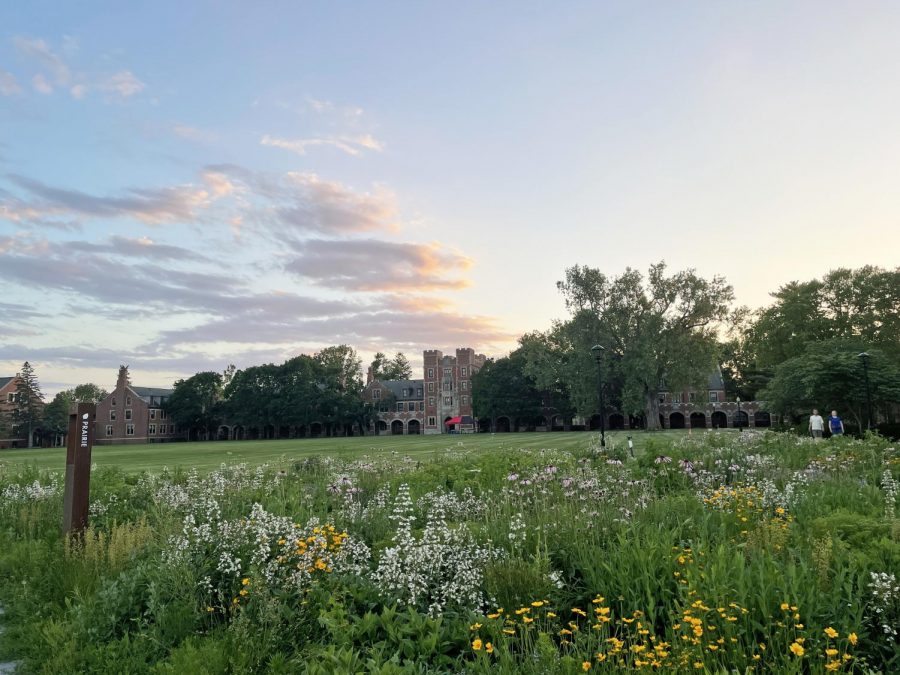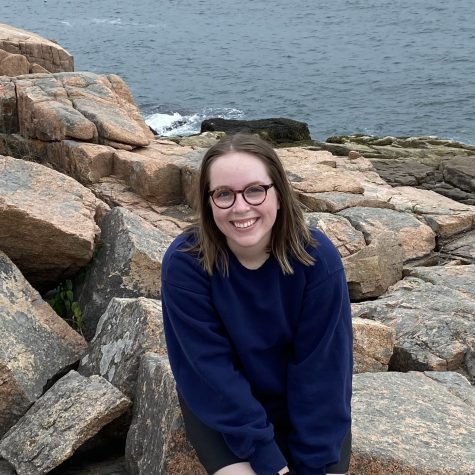Is Grinnell College living up to its land acknowledgement?
Grinnell College had an initiative to grow a plot of plants native to Iowa on a patch of land on Mac Field.
February 12, 2023
2023 Iowa College Media Association award winner, Second Place – Best Print/Online Investigative Reporting
In the five years leading up to the publication of Grinnell College’s land acknowledgment in 2021, zero students who self-identified as American Indian or Native Alaskan enrolled at the College, according to the Integrated Post-Secondary Education Data Set (IPEDS). As Stephanie BadSoldier Snow `03 heard the statement read for the first time at the College’s Multicultural Alumni Reunion in November 2021 over Zoom, she heard a land acknowledgement with historical inaccuracies.
The College’s official land acknowledgement refers to the land the College resides on as the Meskwaki, Sauk and Ioway people’s “ancestral territory.”
“We’re woodland people from the eastern part of what is now the United States and Canada,” said Snow, who currently lives on the Meskwaki settlement with her family and is of mixed Indigenous descent. “We’re not originally from Iowa.”
The Meskwaki people are displaced peoples and have been forcibly relocated from Wisconsin, Iowa, Illinois and Missouri. The Meskwaki Nation, formally known as the Sac & Fox Tribe of the Mississippi in Iowa, is the only federally recognized tribe in Iowa.
In 1857, the Meskwaki people purchased their first 80 acres of land in Iowa, which Snow said was to protect their land, culture and people. The Meskwaki people currently own around 7,000 acres of land. The Meskwaki Settlement is located in Tama County, less than 30 miles from the College.
Leslie Gregg-Jolly, senior faculty member in biology and interim chief diversity officer from 2018 to 2019, described the land acknowledgement as a “dynamic document,” which means the statement would be open to revisions as time goes on.
She drafted pieces of the land acknowledgement as a part of her role as the interim chief diversity officer.
At that time, starting campus events with land acknowledgements became more frequent, but the College did not have an official one.
Land acknowledgements tend to follow the oftentimes short formula of first recognizing the Indigenous tribes who previously lived on typically an institution’s land and ending with an action step.
Gregg-Jolly said that she had done extensive research and consulted many professors, the Committee of Diversity and Inclusion (CDI) and land acknowledgements from peer institutions due to a desire to be careful when drafting the statement.
“I think doing harm is why we were playing so slow,” she said.
While they had the intent to reach out to tribe members, she said they did not get around to doing this during her service as interim chief diversity officer. She left her role before they concluded what to write for the action step and the initial publishing of the statement.
“When you do a land acknowledgement, it is a statement about ownership,” Snow said. “And, it is a statement about pushing someone out that was historically there … to push those people out and make a state out of it.”
Following her realization of the current statement’s historical inaccuracies, Snow pointed them out to President Anne Harris, to which Harris followed up with her to learn more. According to Harris in an email to the S&B, the College is now working on correcting the current land acknowledgement and “go[ing] beyond it to acknowledge and deepen the partnerships between the College and the Nation.”
Snow’s partner Troy Brave Heart said that land acknowledgements are a “fad” belonging to academia.
“It’s easy to get on a microphone or email signature and say something, but then what? What are you doing?” he asked. “And, if the answer is nothing, then why bother?”
The College’s stated respect for Indigenous groups contrasts with the low number of enrolled self-identified Indigenous students. According to the IPEDS for 1990 to 2022, from 2017 to 2021, the College enrolled zero self-identified Native students, who were categorized under “American Indian/Alaska Native.” In 2022, for the first time in five years, two students enrolled identifying as Native.
When Snow attended the College over 20 years ago, she said she was one of the only Native students on campus. While Snow is unaware of any other Meskwaki people who have graduated from the College besides her aunt, who graduated in 1974, she wrote in an email to the S&B that she does know of 5 total Native students who have graduated from Grinnell College. One of these alumni graduated between 2016-2021, though they were not reported as Native in the IPEDS data set.
Ellen de Graffenreid, vice president of communications and marketing, wrote over email that the office of admissions recruits Meskwaki students similarly to other students, including creating opportunities to connect with Grinnell and extending generous financial aid policies. She said the College “regularly [reaches] out to the Meskwaki Nation.”
She also noted that Meskwaki students have the option of attending a tribal college, which allows people from federally recognized tribes to pursue higher education at a lower cost.
Nevertheless, Snow’s son is a sophomore in high school at the Settlement School, and he is interested in attending Grinnell. He said that many students are not aware of the College.
“You’re so close to this college, and you’re so close to the settlement,” he said. “There’s not really much going on.”
Clyde Tarrence, who has been principal of the Settlement School for the past five years, said that he does not recall any outreach from the office of admissions.
In the spring of 2016, the College decided to officially break ties with the Posse Foundation by fall 2017. The Posse Foundation connected underrepresented students from urban areas with colleges paid for with a Posse Scholarship, bringing down the cost of college dramatically. Snow, who worked for the College as interim assistant director of intercultural affairs around this time, said that she thinks a scholarship like the Posse Scholarship for Native students, specifically, would be beneficial.
One appeal of Posse scholars is that they come in cohorts each fall semester, allowing a sense of community to form among the group.
De Graffenreid wrote that according to Brad Lindberg, associate vice president of institutional initiatives and enrollment, a donor would usually initiate the creation of an endowed scholarship program for attracting and retaining underrepresented students. Donors indicate their preference for which groups they would like their donation to benefit.
Snow also noted a distinction between the students and faculty of the College and the administration. Alongside some professors at the College, Snow has engaged in three talking circles surrounding the topic of indigeneity and said they are looking to host another one before this year’s spring graduation.
Brave Heart added, “They, the powers that be, the institution, are disconnected from what is really happening.”
During discussions over the drafting of the original land acknowledgement, the College consulted the CDI, which is composed of students and faculty.
“They were really into action items — not just lip service,” said Gregg-Jolly.
She also said that while the idea of recruiting more Indigenous students was brought up, many members of the CDI were more interested in what they could do to support the community.
In 2019, a group of students from the College expressed interest in working with the Settlement School. Ultimately, this plan did not come to fruition due to extensive background checks that come with working with Native children, according to the principal of the Settlement School.
With the identification of historical inaccuracies, Harris said she hopes the revised land acknowledgement will be up “within a calendar year.”
“This is as much about relationships and respect as it is about words and research — it’s all deeply interconnected,” Harris wrote over email.
Despite Snow’s concerns with the College’s lack of action, she said that she continues to engage with the College by giving talks and helping to teach classes as one of the few visible Native faces on campus. She said that she is hopeful that her family’s legacy of attendance at the College will continue with her elder daughter and son.
Snow about her daughter, who recently applied early decision, said, “It’s not just academics. It’s an all-around person that’s completely capable of being here.”
Editor’s note: This article has been updated to reflect that Snow is aware of five total Native students who have graduated from Grinnell College. A quote has additionally been updated to correctly attribute Snow, rather than her daughter. The S&B regrets this error. Updated March 6, 2023, 4:40 p.m.




















































